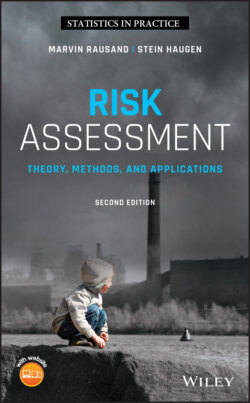Читать книгу Risk Assessment - Marvin Rausand - Страница 25
2.2 Risk
ОглавлениеBernstein (1998) claims that the word risk entered the English language in the 1660s from the Italian word risicare, which means “to dare.” This tells us something about what risk may mean, but if you ask ten people about the word risk, you most likely get ten different answers. The same inconsistency prevails in newspapers and other media. A search for the word risk in some Internet newspapers gave the results in Table 2.1 .
Table 2.1 The word risk as used in some Internet newspapers (in 2018).
| Ford recalls electric car power cables due to fire risk.Is financial turmoil in Turkey and other emerging economies at risk of spreading?Are there any other legal risks?Investors are willing to take on a high risk.Bridge designer warned of risk of corrosion.Saturday features more widespread rain risk.Multigene test may find risk for heart disease.We could put at risk our food and water supplies.This political risk was described in an intriguing analysis.Because of the risk of theft. | Reindeer at risk of starvation after summer drought.Coalition at risk as talks on refugee policy falter.Seven ways to minimize the risk of having a stroke.Company to close 42 stores, putting 1500 jobs at risk.Death is a risk the drivers willingly take and their loved ones accept.You are putting lives at risk over Brexit.This carries an accident risk of “Chernobyl proportions.”£ 80 billion investment plan at risk. |
In some of the statements, the word “risk” may be replaced with chance, likelihood, or possibility. In other cases, it may be synonymous with hazard, threat, or danger. The situation is not much better in the scientific community, where the interpretation is almost as varying as among the general public. A brief search in risk assessment textbooks, journal articles, standards, and guidelines easily prove that this applies also for the specialists in risk assessment.
